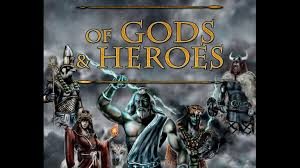
Why do I keep coming back to Channeling? Tackling Spell Law deconstruction and rewrite forced me to look at all the underlying assumptions around the magic system—not just RM but other games as well. I think Essence (generic magic) is easy: as long as you allow for the phenomena, then simple rules allow for casting spells. Mentalism is not much different than Essence and often conflated as Psionics. Channeling is a whole other can of worms: God given magic REALLY needs to work in a completely different way. We’ve discussed Channeling in depth in several blogs HERE, HERE and HERE.
How might Channeling be different than the other two magic Realms?
Spell Acquisition. Unlike Essence or Mentalism, a PC can’t just go to a library, secure a scroll, learn a spell list and then cast a channeling spell. A “God” must give at least tacit approval for someone to cast a channeling spell. Additionally, you could argue that no learning is really needed—spells could be directly granted by the Diety. This changes the standard process of spell acquisition.
Spell Effects. Common sense would dictate that a caster might not be able to provide magical buffs, benefits or spell effects to targets of an opposing Diety. Unlike Essence which is agnostic, Channeling is driven by an ethos, aspect or belief system. You shouldn’t be able to heal a follower of a mortal foe of your God…right? So the whole group dynamic might be complicated when the Cleric is the primary “buffer” and healer for the group but the other members of the group worship different gods.
Force Majeure. RM Channeling description suggests that PP’s are funneled to the caster and in my BASiL project the spell itself is funneled to the caster (ie like a software download). Either way, the Diety is providing, approving or allowing part of the casting formula. That requires SOMETHING in return on the part of the caster: certain behavior, loyalty, tribute, sacrifice, tithing etc.
Certainly much of this relies on the setting. These may seem like niggling over fine points; and you can certainly hand-wave away any needed explanation—it is religion after all. But RM and RM users take a certain pride in quantifying effects into game mechanics: detailed herbs and spells for healing; complicated Alchemy rules for magic item creation; math driven charts for modelling weapons and armor effects. If Channeling raises some broader questions about its use, than why not establish this in the game rules?
Personally, I’ve come down to two broad options:
Option 1. Disconnect the Channeling mechanism between a caster and a Diety. As Peter argued, Channeling could just be rolled into Essence as “general magic”. That makes sense. Just disconnecting Dieties from spell casting mechanics eliminates all of the awkward questions that Channeling raise in the above examples. If you were you to do that, what then would be the purpose of Dieties?
- They can still bestow “beneficence” in answer to prayers for held or assistance.
- Lead, create and direct religious organizations.
- Control the dissemination of hidden knowledge (spell lists and certain skills).
- Interfere in the mortal world
Under this option, Gods are still supreme entities, still have the same powers, play the same role in the world but just don’t act as a conduit for Channeling spells.
Option 2. Go “all in”. Further develop Channeling as a relationship between a powerful being and a follower. If we accept that channeling magic is controlled, allowed, or provided by a Diety than how should that work? More importantly, what prohibits anyone from being having followers and Channeling spells/power to them? I’ve touched upon this with my BASiL Channeling project—spells that only work with designated targets: loyal followers, henchmen, oathbound etc.
The idea goes back to the issues explored earlier—that a Cleric can provide powerful benefits, but only to followers of the same Diety. For Holy Warriors, it becomes even more specific—benefits are only bestowed upon the group, militia or organization of the Holy Warrior. (ie High Templars cast spells to the benefit of his soldiers and/or followers).
The Gods of Shadow World aren’t really gods—just very powerful entities from another dimension. How do they parse out spells/powers? Do they control the entry point of Essaence into Kulthea? Did they devise spells and teach them to their followers? If they are just powerful beings, then can any powerful PC or NPC also grant similar spell ability to their followers? Popular fiction is replete with “Lords” or “Archmages” bestowing their hirelings and henchmen with special abilities—isn’t this Channeling? How about the Dragonlords? Are they powerful enough to act as Minor Gods? Can Minor Gods in Kulthea also provide Channeling to their followers?
At what point can a person bestow spells or power to another? RM already establishes a base mechanism for transferring PP’s or spells with the Channeling SKILL. I would take it a step further: a formalized process of creating a relationship between “god/lord/being” and “followers”. I played around with an initial spell list concept I uploaded HERE. (RM Forum account needed to access the list). Conceptually, the mechanics of a Channeling process should include:
- Bond, link or loyalty or obligations between a god & a follower.
- Mutual benefits to both parties. (follower gets spells/benefits, God gets…?)
- A substantial downside if the bond is broken, destroyed or a party is killed.
My list needs a lot more work (more specifics on penalties and drains–comments welcome) and is just one possibility of many. (Perhaps the Lords of Orhan use a similar but different spell list). But the framework is there and I like the possibilities for a number of reasons:
- It allows a PC/NPC to grow in power outside of the normal experience/level/skill paradigm.
- Establishes a known process for Gods to be created/and or a player to ascend to a demi or minor god.
- Creates a mechanism for a powerful lord/being/god to influence a local event or encounter.
- Provides benefits for a player to pledge to a lord/God.
- Balances risk and reward for such a relationship. (need some more work on this)
- Acts as an adventure hook.
Is the list too powerful? It certainly wouldn’t be readily available, but let’s review the cost/benefit analysis to a PC using the list:
- A follower would have to forgo any other Channeling relationship. (no other god)
- The player would need to offer a real benefit to a follower to justify their fealty.
- Followers would be a liability. An adversary would target a player’s followers knowing that would weaken or harm the player.
- Each follower will require a resource drain on the player.
- The benefit would be a growing pool of devoted followers which the player can enact agency through and receive some benefit (HP, PP, stat points?—needs some more thought)
Ultimately Options 1 and 2 aren’t mutually exclusive. I can still disconnect Channeling realm from Dieties and still have the Channeling list and mechanics. Anyway, this went from a thought experiment: “how should Channeling Realm work” to the start of an interesting game mechanic for my SW campaign. Channeling isn’t just for Gods anymore!








